Engender blog
5 things you need to know about the Social Security (Scotland) Bill
The anticipation is over. Last week, the Scottish Government tabled its social security legislation. Below, our policy manager Emma Trottier gives you a quick rundown of what’s what in the Social Security (Scotland) Bill.
What is the Social Security (Scotland) Bill?
The Scottish Government has called the Bill ‘enabling legislation’, which means the objective of the Bill is to the set the foundation for the social security system in Scotland.

The first thing you’ll see in the Bill are the principles. The principles, outlined here, will guide the new social security system:
- Social security is an investment in the people of Scotland;
- Social security is itself a human right and essential to the realisation of other human rights;
- Respect for the dignity of individuals is to be at the heart of the Scottish social security system;
- Scottish Ministers have a role in ensuring that individuals are given what they are eligible to be given under the Scottish social security system;
- The Scottish social security system is to be designed with the people of Scotland on the basis of evidence;
- Opportunities are to be sought to continuously improve the Scottish social security system in ways which put the needs of those who require assistance first; and
- The Scottish social security system is to be efficient and deliver value for money.
These are laudable principles, but absent from the Bill is an answer to the question: what does the social security system in Scotland seek to achieve? The purpose of any social security system is to reduce inequalities. Social assistance seeks to build a more equal society by giving people the means to live a safe, fulfilling and dignified life. In reality, it predominantly supports women. Why? Because factors like low-paid work, caring responsibilities and violence against women result in women being twice as dependent on social security as men.
Given the above, you might have some idea of how we would answer the question: what should the Scottish social security system seek to achieve? It should seek to achieve equality, and by virtue of there being a disproportionate number of women relying on social security for their safety and well-being, it should seek to achieve a more gender-equal society.
In addition to outlining principles, the Bill also commits to developing a charter. The purpose of the charter would be to let people know what can be expected from the social security system in Scotland. The plan is to draft the charter in consultation with people who receive social security. We’ll keep you updated as plans for the charter progress.
What does the Bill say about the day-to-day operations of the social security system?
The Bill is pretty high-level, but there is some information about process. For example, the Bill outlines the application process (which the Bill refers to as ‘determination’ ) and also the processes for: 1) reconsidering an application (which the Bill refers to as ‘redetermination’ ); and 2) appealing decisions made by the Scottish Government (e.g., the First-tier tribunal). If you’re looking for more specific details, like in what timeframe the Scottish Government will make a decision on your application for social security, you’ll be disappointed. The Bill doesn’t include information on elements like timescales.
-300.png)
The Bill also sets out the types of social security programs that will be managed by the Scottish Government (e.g., Carer’s Allowance) and gives authority to the Scottish Government to develop eligibility criteria and the level of payment for each social security program. In other words, there isn’t much on the specifics – with one exception. A special, temporary provision is made in the Bill for Carer’s Allowance, which is only temporary until the provision can be included in regulation. The Bill will place a duty on Scottish Ministers to pay a twice yearly supplement to those who receive Carer’s Allowance. The supplementary payments will bring Carer’s Allowance in line with Jobseeker’s Allowance.
How did Scotland get powers over these social security programs?
We need to go back a few years to answer to this question.
In 2014, following the Scottish independence referendum, the former Prime Minister announced that the Lord Smith of Kelvin had agreed to oversee the process to take forward the devolution commitments on further powers for the Scottish Parliament. This process eventually led to the report by the Smith Commission, which recommended that the Scottish Parliament be given new powers to:
- Control certain social security programmes; and
- Make discretionary payments in any area of welfare without the need to obtain prior permission from the department of work and pensions
The devolution of these and other powers happened in 2016 by virtue of the Scotland Act 2016. This piece of legislation gave Scotland power over certain social security programs. A list of the programs that are devolved to the Scottish Parliament and reserved to Westminster can be found here.
What about split payments of Universal Credit?
You might remember that we, along with other equalities organisations, called on the Scottish Government to introduce automatic individual payments of Universal Credit, with entitlements relating to children allocated to the main carer and elements for disability, unpaid carers and housing dispersed accordingly.

We are still calling for automatic split payments of Universal Credit. One payment to one partner in a couple is likely to result in less equal relationships, with one individual less able to access income. While relevant to both sexes, it is especially relevant to women. In broad terms, it is a matter of principle that everyone should have access to an independent income.
The Bill doesn’t make any provisions around the three Universal Credit flexibilities. As a quick refresher, the Scotland Act (2016) gave Scotland the power to make regulations concerning:
- The way the housing element of Universal Credit is calculated for those who rent their accommodation;
- The housing cost element, specifically that it can be paid to someone on behalf of the recipient of Universal Credit; and
- To whom and when the Universal Credit payments are made.
Since the Scotland Act (2016) already provides power to make regulations over the Universal Credit flexibilities, there isn’t a need to refer to these three flexibilities in the Social Security (Scotland) Bill. As such, the Bill doesn’t speak to split payments of Universal Credit.
That said, the door isn’t closed on split payments. In their policy memorandum, which was introduced alongside the Social Security (Scotland) Bill, the Scottish Government explains that ‘Further discussions and policy development will be taken forward with stakeholders on flexibility to split payments between members of a household’.
What happens now?
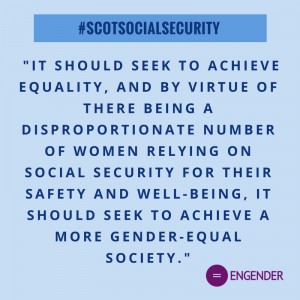
First things first, our aim here is to provide some quick facts about the Social Security (Scotland) Bill, but this isn’t the end. Over the last few days, we’ve been analysing the Bill, reviewing our recommendations for the Scottish social security system, and poring over the Scottish Government’s analysis of responses to its consultation on social security. Once our analysis is ready, it’ll provide greater detail on the Bill and on our thoughts about what’s being proposed. Stay tuned.
Over the next few months, we’ll be working with the Scottish Government and the Scottish Parliament to ensure that the proposals in the Bill respond to the concerns women have with the existing social security system. We have such a unique experience in Scotland – to build a social security system from the ground up. Let’s make sure we do it right.Share this post on …
Comments: 0 (Add)
Downloads
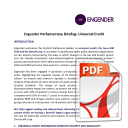 Engender Parliamentary Briefing: Universal Credit
This is a briefing ahead of the Scottish Labour Debate in the Scottish Parliament on Universal Credit on 20th November 2019.
Engender Parliamentary Briefing: Universal Credit
This is a briefing ahead of the Scottish Labour Debate in the Scottish Parliament on Universal Credit on 20th November 2019.
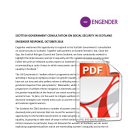 Engender Response to Scottish Government Consultation on Social Security in Scotland
Engender welcomes this opportunity to respond to the Scottish Government’s consultation on social security in Scotland.
Engender Response to Scottish Government Consultation on Social Security in Scotland
Engender welcomes this opportunity to respond to the Scottish Government’s consultation on social security in Scotland.
 Engender Response to the Scottish Government Consultation on Universal Credit (Claims and Payments) (Scotland) 2017
Engender welcomes the opportunity to respond to the consultation on the proposed regulations respecting two of the devolved flexibilities related to Universal Credit.
Engender Response to the Scottish Government Consultation on Universal Credit (Claims and Payments) (Scotland) 2017
Engender welcomes the opportunity to respond to the consultation on the proposed regulations respecting two of the devolved flexibilities related to Universal Credit.
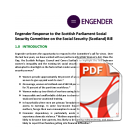 Engender Submission to the Scottish Parliament Social Security Committee on the Social Security (Scotland) Bill
Engender welcomes the opportunity to respond to the Committee’s call for views.
Engender Submission to the Scottish Parliament Social Security Committee on the Social Security (Scotland) Bill
Engender welcomes the opportunity to respond to the Committee’s call for views.
 Joint Briefing ahead of the Scottish Parliament Social Security (Scotland) Bill Stage 3 Debate on Universal Credit
Ahead of the Stage 3 Debate in Parliament, Engender, along with The Scottish Council for Voluntary Organisations, One Parent Families Scotland, Advocard, The Health and Social Care Alliance, Poverty Alliance, Scottish Women’s Aid, and the National Association of Welfare Rights Advisers have produced a briefing in support of Amendment 144 Universal Payment: Payment to Joint Claimants to the Social Security (Scotland) Bill.
Joint Briefing ahead of the Scottish Parliament Social Security (Scotland) Bill Stage 3 Debate on Universal Credit
Ahead of the Stage 3 Debate in Parliament, Engender, along with The Scottish Council for Voluntary Organisations, One Parent Families Scotland, Advocard, The Health and Social Care Alliance, Poverty Alliance, Scottish Women’s Aid, and the National Association of Welfare Rights Advisers have produced a briefing in support of Amendment 144 Universal Payment: Payment to Joint Claimants to the Social Security (Scotland) Bill.
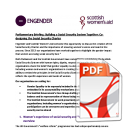 Joint Engender and SWA Parliamentary Briefing ahead of the Scottish Government Building a Social Security System Together Debate
Engender and Scottish Women’s Aid welcome this opportunity to discuss the creation of the Social Security Charter and the importance of ensuring women’s voices are heard in the process.
Joint Engender and SWA Parliamentary Briefing ahead of the Scottish Government Building a Social Security System Together Debate
Engender and Scottish Women’s Aid welcome this opportunity to discuss the creation of the Social Security Charter and the importance of ensuring women’s voices are heard in the process.
Social Security Consultation Focus Groups - Report A report of eight focus groups run by Engender, Scottish Women's Aid, Carers Scotland and the Scottish Refugee Council, to contribute to the Scottish Government consultation on social security.
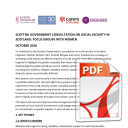 Social Security Consultation Focus Groups - Report
A report of eight focus groups run by Engender, Scottish Women's Aid, Carers Scotland and the Scottish Refugee Council, to contribute to the Scottish Government consultation on social security.
Social Security Consultation Focus Groups - Report
A report of eight focus groups run by Engender, Scottish Women's Aid, Carers Scotland and the Scottish Refugee Council, to contribute to the Scottish Government consultation on social security.

Newsletter
Sign up to receive our newsletter here:
Sign up to our mailing list
Receive key feminist updates direct to your inbox: